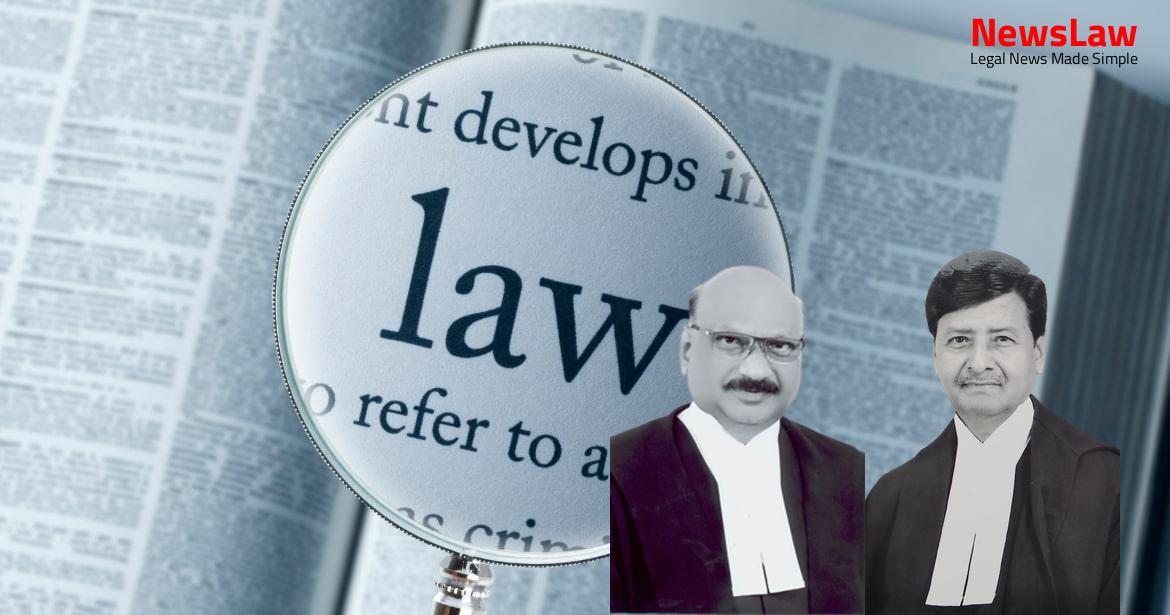Delve into a critical legal examination where the court’s decision was hinged upon the sole testimony of the prosecutrix. The court’s detailed analysis and trust in the prosecutrix’s account showcase the significance of victim testimonies in cases of sexual offences. The legal intricacies surrounding corroboration, alibi pleas, and judicial sensitivity towards victims are prominent features in the court’s legal analysis.
Facts
- The learned trial Court did not believe the plea of alibi and DW1.
- The trial Court convicted the accused for the offence under Section 376 IPC.
- The appellant-accused appealed to the High Court against the conviction and sentence.
- The High Court dismissed the appeal and confirmed the conviction and sentence.
- The original accused has now preferred an appeal before the Supreme Court.
- The prosecutrix narrated the incident to her sister-in-law and mother-in-law who did not believe her.
- Her uncle and others were informed about the incident, and she was taken to her parental house.
- The prosecutrix was sent for medical examination after the incident.
- The accused pleaded not guilty and was tried for the offence of rape.
- The accused pressed the mouth of the prosecutrix, committed rape, and then fled by jumping the wall.
- The prosecutrix informed other family members at her matrimonial house who did not take any action.
- The information was sent to her parental house.
- Witnesses including the doctor, prosecutrix, and Investigating Officer were examined by the prosecution.
- One witness, Rajaram, did not support the prosecution story and was declared hostile.
- A charge-sheet was filed against the accused after completion of the investigation.
- The accused claimed an alibi stating he was in Indore on the day of the incident and not in the village.
Also Read: Legal Analysis on Concurrent Sentences in Drug Trafficking Cases
Arguments
- Petitioner prays to convert the rigorous imprisonment to simple imprisonment.
- Prosecution case is solely based on the testimony of the prosecutrix.
- Accused convicted under Section 376 IPC based on prosecutrix’s testimony.
- No other witnesses support the prosecutrix’s case.
- Prosecution lacks corroboration from medical evidence.
- Petitioner requests a reduction in sentence already undergone.
- FIR lodged three days after the incident.
- Prosecutrix’s credibility and trustworthiness are not doubted.
- No cross-examination regarding filing a false case against the accused.
- Reliance on various court decisions for conviction based on prosecutrix’s testimony.
- Conviction can be sustained based on the sole testimony of the prosecutrix if it inspires confidence.
- There is no rule of law or practice that the evidence of the prosecutrix cannot be relied upon without corroboration.
- The prosecutrix has been medically examined after three days of the incident and has consistently stood by her evidence, supporting the prosecution’s case.
- There is no suggestion in the cross-examination that it was a case of consent.
- Accused’s plea of consent and alibi were contradictory, and the trial court had valid reasons not to believe the alibi witness.
- The absence of external or internal injuries in the prosecutrix does not discredit the prosecution’s case.
Also Read: Legal Jurisdiction and Award Finality in Arbitration Dispute
Analysis
- The credibility and trustworthiness of the prosecutrix is not doubted.
- The sole testimony of the prosecutrix is found to be reliable and trustworthy.
- The accused’s submission that lack of injuries indicates consent has no substance.
- DW1 and the accused’s alibi of being in Indore on the night of the incident was not believed by the court.
- The delay in lodging the FIR cannot benefit the accused, especially since the prosecutrix was not supported by her family members.
- The prosecutrix consistently supported the prosecution’s case and withstood thorough cross-examination.
- No other independent witnesses were needed as the sole testimony of the prosecutrix was believed.
- The court rightly disbelieved the plea of alibi and DW1 based on the evidence presented.
- The prosecutrix narrated the incident to her sister-in-law and mother-in-law immediately but was not believed and faced abuse.
- The minimum sentence of seven years rigorous imprisonment was appropriate, and no reason was established for a lesser sentence.
- The proviso to Section 376 IPC allows for a sentence less than seven years only for specific and mentioned reasons, which were not present in this case.
- The court may seek evidence that can lend assurance to the testimony of the prosecutrix if it is hesitant to rely on her testimony implicitly.
- Corroboration is not mandatory for relying on the testimony of the prosecutrix in cases of sexual offences.
- The prosecutrix’s testimony must be evaluated based on the entire case, and any delay in filing an FIR for a sexual offence may not discredit her testimony.
- If the court finds it difficult to rely on the prosecutrix’s testimony, it can seek evidence that assures her testimony without full corroboration.
- The negligence of an investigating officer should not affect the credibility of the prosecutrix’s statement.
- The Evidence Act does not mandate corroboration for the testimony of the prosecutrix, and if found credible, her testimony can be the basis for conviction.
- The court must be sensitive in cases of sexual harassment, molestation, etc., and should weigh the evidence instead of counting minor contradictions.
- The testimony of the victim of sexual assault is sufficient for conviction and does not always require corroboration.
- The court must remain mindful of the inherent bashfulness of females in cases of sexual assault and should not overlook the victim’s testimony.
- The court should not insist on corroboration of the prosecutrix’s statement unless there are compelling reasons to do so, as seeking corroboration can add insult to the injury suffered by the victim.
- The accused put forward an alibi as a defense.
- The alibi was found to be false by the courts below.
- The courts did not accept the alibi plea.
- The rejection of the alibi played a crucial role in the decision of the case.
Also Read: Upholding Professional Standards in Legal Disciplinary Proceedings
Decision
- The present appeal has failed and is dismissed.
- The prayer of the appellant to reduce the sentence and convert it to simple imprisonment is rejected.
- The conviction and sentence under Section 376 IPC is confirmed.
Case Title: PHOOL SINGH Vs. THE STATE OF MADHYA PRADESH (2021 INSC 812)
Case Number: Crl.A. No.-001520-001520 / 2021



